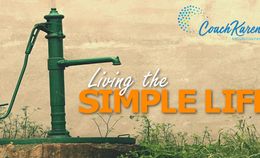Congratulations to all of you high school graduates!
When I graduated from high school, I did the only thing I knew to do. I went to college. Education was sacrosanct in our house, and the expectation was that college followed high school.
I applied to the same school my grandfather, my parents and my siblings attended, San Diego State University. I followed my father’s advice to get a business degree, and I eventually followed his advice to continue on with my education. Now, at 50, I'm proud to say I have been a life-long learner with two master’s degrees, a Ph.D. and numerous certifications.
Things are different now. The opportunities for learning are greater than ever before, and life after high school is far more complicated.
For those parents out there, who insist your child go to college to become a lawyer or a doctor, believing it makes lots of money and is the best or only path to success, you are hindering your child from making THEIR choice. If this career path is not a choice they’re making for themselves, you may be in for a world of disappointment. You must be open to other possibilities and supportive of what success looks like for them.
The world is a big, messy place, and it can be scary knowing the structured life they’ve always known is ending. As they venture on, whether that be college, the workforce, or the military, there are life-skills teens should have, or should choose to develop, for adjusting to life after high school.
Self-Awareness
I went to college and got a degree in business after high school. Was that because I wanted to run a Fortune 500 company? Not really. In truth, I didn’t know what I wanted to do. Many young people don’t.
I was fortunate enough to find my way in this world quickly. I started working for the Center for Creative Leadership the day after I graduated from college in May of 1993. That first real job fed my need to help others. By guiding them in their lives and their careers, I found where my strengths and passions lay.
My situation is unique. Almost no one, walks out of high school, into college, and right into a company they’ve worked with, and continue to work with, for 26 years. Today’s youth don’t expect to work for the same company for a lifetime. Indeed, many don’t even expect to have the same career 26 years from now.
But before our new grads can make some of these decisions, they must first understand themselves. This is far easier said than done. However, there are lots of resources out there to at least grapple with some of the essential components of identity.
One of the most prevalent tools is the Myers-Briggs Type Indicator® (MBTI®) personality inventory. This personality test can be completely enlightening to an individual who is emerging as their own person. Something as simple as noting as whether one is an introvert or an extrovert, can give worlds of guidance to a young adult.
These assessments not only give insight to the individual, but allow them to view others, and their differences, without making value judgements. Introversion is not bad. Extroversion is not bad. They are merely different indicators of how we prefer to move through the world.
Become a Life-Long Learner
As I said before, things have changed for high school graduates these days. With so many opportunities to gain knowledge, learning has popped up everywhere.
Gone are the days of HAVING TO search through moldy card catalogues and quiet libraries. Nowadays, libraries offer digital downloads and audio books. Indeed, many of the classical works of poetry and literature are in the public domain and freely searchable online.
But you don’t even need to get a library card (although I am a regular user of mine). The internet is a treasure trove of free information, video tutorials, reviews and data on certification programs, and yes, even college credits.
Gone, too, are a lot of the traditional ideas on higher education. Many companies are seeing the light when it comes to an extensive and extended onboarding process, ongoing training, and mentoring promising young talent.
Regardless, the world is ever-changing, and your learning needs to follow suit.
Communication, Communication, Communication
I remember when I was doing a lot of work with corporate clients, there was a Harvard study in the late 90’s. Essentially, it was looking at a number of people who were let go from management positions precisely because of their inability to effectively interact with other people.
Think about that. These are people who had done everything right. They were educated, smart, goal oriented, and results driven. The one thing they could not do consistently was communicate effectively with upper management or those they managed.
It is so important to develop communication skills, not just so your voice is heard, but so that you can acknowledge those around you. Communication takes at least two. So, work on your communication.
Influence & Negotiation
Part of communicating is your ability to influence and negotiate. I knew I was raising a future United Nations Negotiator when he was only two. He had taken a Chapstick out of my purse and was rolling it up. “Up,” he said. I shook my head and told him, “Down.” He shook his head and insisted on, “Up.” This went on for a few rounds when I thought I’d throw him and his hard-headedness for a loop. “Up,” I said. He paused, pointed at me, and said, “Not down.”
I’ve always tried to nurture my children’s true natures and to give them opportunities to be in charge of their decisions. This is not to say I let them do whatever they wanted. Far from it. But I cultivated their taking responsibility for showing me why they should be able to do something or buy something.
The aforementioned negotiator (now 16, by the way) approached me just last week about getting a laptop. When I offered to get him a Chromebook like he had at his last school, he came back to me with a four-page report on the advantages of getting a laptop over a Chromebook, including options, pricing, technical specifications, and lists of the types of programs and activities he planned to utilize.
While my son is a natural born influencer, for many others, this is not a natural way of doing things. It takes practice and communication skills to influence others to your way of seeing things. Many things in life also take compromise. These are all parts of communication that successful young adults need to master.
Feedback & Conflict Management
Another key communication skill is the art of feedback and conflict management. Let’s be clear, feedback means receiving as well as giving, and even well-intentioned, constructive criticism is the source of most conflicts.
In an age where we Yelp-review every Slurpee, it’s become commonplace to leave feedback. With the anonymity of the internet and lots of social media, much of this feedback comes out as….less than delicate.
In the real world, whether its work or friendships, feedback that is not constructive is rarely appreciated. There are manners and feelings and codes of etiquette. Even when constructive feedback comes from the right place, it can hit us too hard. We may not want to hear it, but as an important part of self-awareness. In order to grow and develop, we do need to hear it. Your response then may be to coach the other person in how they can give you advice in a way that you can hear it.
Conflict also arises out of how we give and receive feedback. How we manage that conflict is equally important and warrants the same care you take in offering comments and advice.
No matter how high you climb, whether it’s socially or professionally, there will always be feedback and conflict.
Resiliency
This is a key skill for adults, the ability to bounce back from life’s setbacks. Like a rubber band, you can stretch and stretch. But if you’re not careful, you can go too far and snap.
Resiliency is a skill that needs to be exercised, often through discipline and practice, so that it can be built up against bigger and bigger challenges. So, that regardless of the stressors and obligations of their lives they can bring balance back to their lives. Whether it's their social lives or their mental, physical, or emotional well-being, they need to learn to reset and move on.
There’s a lot of ways to help exercise that resiliency, and stress management is at the top of the list. What most young people neglect, and often don’t equate with stress, are the simple, healthy life choices you can implement regularly: a good night’s sleep, being active on a daily basis, or just taking some time to stop and breathe or read or watch the world go by. These activities and more can limit the stretch on your rubber band, leading to fewer snapping moments.
A note to you helicopter parents out there, hovering around your child and stepping in to aid them in their setback and conflicts: give your child a chance to resolve her own issues. It’s a critical lesson for a young person. They must build their own resiliency and be allowed to solve their own problems. It can be hard to watch them struggle, but it is a critical skill every adult should have.
Motivation & Encouragement
When I speak of motivation, I don’t just mean. “Rah-rah! Sisk boom bah!” I mean being able to move through those moments of life that just need to get done. Whether it's your first adult tax filing or even the end of a relationship, life can throw you some wicked curves. You must be able to pick yourself up and move forward in life.
As teenagers, our children look to external motivation, and often is parents who offer this encouragement in the form of honest feedback. But as a young adult, they will need to harness their internal motivation when met with life’s challenges. They will need to be honest with themselves and find a way to either move forward or change directions.
Setting Purpose, Direction, & Goals
Right now, just after graduation, you may have one purpose. It may be making money for college or a car. It may be to explore several different jobs before you start college or decide on a career path. But remember, you are young. Your purpose may change. But you need to foster that reason to move forward in your life.
In addition to purpose, clearly defining measurable goals for yourself gives clarity to your actions. It allows you to plan what you need to do to reach those goals. Young people should look closely at what their purpose and direction are. These will help to define where they are going next.
Although I advocate for young people to make their own choices, parents should continue to offer advice, show support, and offer a safe space for their self-discovery. With this support, there is a lot of room for teens to grow into healthy, independent young adults.




















